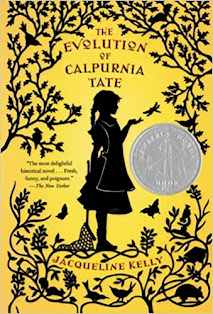The Evolution of Calpurnia Tate
 Not that it
matters, but I can’t decide whether this is a book for children that adults can
enjoy, or a book about children for adults. Jacqueline Kelly
manages to describe 12-year-old Calpurnia Tate’s adventures in the last six
months of 1899, in Texas, in a way that’s packed with clever observations of the
way a 12-year-old sees the world, yet at the same time make it sound as though
all those observations are coming from Calpurnia herself.
Not that it
matters, but I can’t decide whether this is a book for children that adults can
enjoy, or a book about children for adults. Jacqueline Kelly
manages to describe 12-year-old Calpurnia Tate’s adventures in the last six
months of 1899, in Texas, in a way that’s packed with clever observations of the
way a 12-year-old sees the world, yet at the same time make it sound as though
all those observations are coming from Calpurnia herself.
Here’s the thing though. Calpurnia couldn’t have written this book; no child of 12 possesses the vocabulary it uses. Yet there’s never a single moment when the narrator’s voice doesn’t sound like that of an actual 12-year-old. It’s a juggling trick I’m still trying to comprehend and my hat is off to Jacqueline Kelly for achieving it so seemingly effortlessly.
Now, does any of this matter? Not for a second. Calpurnia’s world – where boys look for wives and girls learn to cook and sew so they can become wives – is vividly described. As are Calpurnia’s constant little rebellions against such expectations, and her thirst for knowledge on scientific expeditions with her Granddaddy, a man who’s corresponded with Charles Darwin and has little time for social convention.
It’s a world without air-conditioning (you can feel the heat of a blistering summer); where the arrival of the first telephone in town brings every inhabitant out to see it (and marvel that that the operator is to be paid ten whole dollars a week!); where men smoke like forest fires and it’s a thrill just to sit in the first automobile anyone has ever seen. It all just leaps off the page.
And there's a sequel too. I can't wait!


Comments
Post a Comment